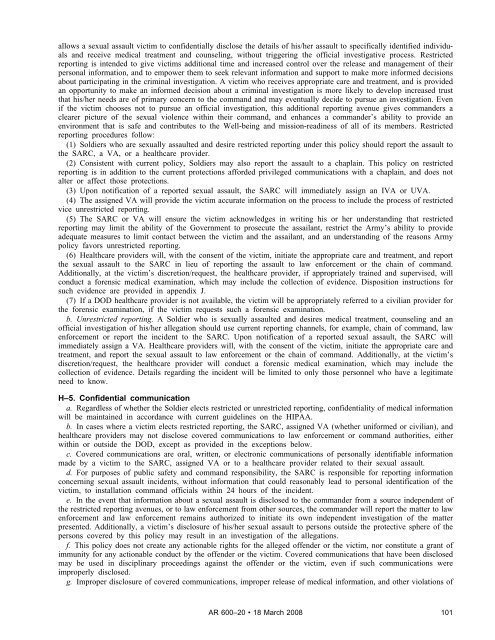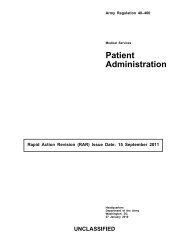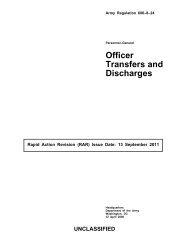AR 600-20, Army Command Policy - Army Publishing Directorate ...
AR 600-20, Army Command Policy - Army Publishing Directorate ...
AR 600-20, Army Command Policy - Army Publishing Directorate ...
Create successful ePaper yourself
Turn your PDF publications into a flip-book with our unique Google optimized e-Paper software.
allows a sexual assault victim to confidentially disclose the details of his/her assault to specifically identified individuals<br />
and receive medical treatment and counseling, without triggering the official investigative process. Restricted<br />
reporting is intended to give victims additional time and increased control over the release and management of their<br />
personal information, and to empower them to seek relevant information and support to make more informed decisions<br />
about participating in the criminal investigation. A victim who receives appropriate care and treatment, and is provided<br />
an opportunity to make an informed decision about a criminal investigation is more likely to develop increased trust<br />
that his/her needs are of primary concern to the command and may eventually decide to pursue an investigation. Even<br />
if the victim chooses not to pursue an official investigation, this additional reporting avenue gives commanders a<br />
clearer picture of the sexual violence within their command, and enhances a commander’s ability to provide an<br />
environment that is safe and contributes to the Well-being and mission-readiness of all of its members. Restricted<br />
reporting procedures follow:<br />
(1) Soldiers who are sexually assaulted and desire restricted reporting under this policy should report the assault to<br />
the S<strong>AR</strong>C, a VA, or a healthcare provider.<br />
(2) Consistent with current policy, Soldiers may also report the assault to a chaplain. This policy on restricted<br />
reporting is in addition to the current protections afforded privileged communications with a chaplain, and does not<br />
alter or affect those protections.<br />
(3) Upon notification of a reported sexual assault, the S<strong>AR</strong>C will immediately assign an IVA or UVA.<br />
(4) The assigned VA will provide the victim accurate information on the process to include the process of restricted<br />
vice unrestricted reporting.<br />
(5) The S<strong>AR</strong>C or VA will ensure the victim acknowledges in writing his or her understanding that restricted<br />
reporting may limit the ability of the Government to prosecute the assailant, restrict the <strong>Army</strong>’s ability to provide<br />
adequate measures to limit contact between the victim and the assailant, and an understanding of the reasons <strong>Army</strong><br />
policy favors unrestricted reporting.<br />
(6) Healthcare providers will, with the consent of the victim, initiate the appropriate care and treatment, and report<br />
the sexual assault to the S<strong>AR</strong>C in lieu of reporting the assault to law enforcement or the chain of command.<br />
Additionally, at the victim’s discretion/request, the healthcare provider, if appropriately trained and supervised, will<br />
conduct a forensic medical examination, which may include the collection of evidence. Disposition instructions for<br />
such evidence are provided in appendix J.<br />
(7) If a DOD healthcare provider is not available, the victim will be appropriately referred to a civilian provider for<br />
the forensic examination, if the victim requests such a forensic examination.<br />
b. Unrestricted reporting. A Soldier who is sexually assaulted and desires medical treatment, counseling and an<br />
official investigation of his/her allegation should use current reporting channels, for example, chain of command, law<br />
enforcement or report the incident to the S<strong>AR</strong>C. Upon notification of a reported sexual assault, the S<strong>AR</strong>C will<br />
immediately assign a VA. Healthcare providers will, with the consent of the victim, initiate the appropriate care and<br />
treatment, and report the sexual assault to law enforcement or the chain of command. Additionally, at the victim’s<br />
discretion/request, the healthcare provider will conduct a forensic medical examination, which may include the<br />
collection of evidence. Details regarding the incident will be limited to only those personnel who have a legitimate<br />
need to know.<br />
H–5. Confidential communication<br />
a. Regardless of whether the Soldier elects restricted or unrestricted reporting, confidentiality of medical information<br />
will be maintained in accordance with current guidelines on the HIPAA.<br />
b. In cases where a victim elects restricted reporting, the S<strong>AR</strong>C, assigned VA (whether uniformed or civilian), and<br />
healthcare providers may not disclose covered communications to law enforcement or command authorities, either<br />
within or outside the DOD, except as provided in the exceptions below.<br />
c. Covered communications are oral, written, or electronic communications of personally identifiable information<br />
made by a victim to the S<strong>AR</strong>C, assigned VA or to a healthcare provider related to their sexual assault.<br />
d. For purposes of public safety and command responsibility, the S<strong>AR</strong>C is responsible for reporting information<br />
concerning sexual assault incidents, without information that could reasonably lead to personal identification of the<br />
victim, to installation command officials within 24 hours of the incident.<br />
e. In the event that information about a sexual assault is disclosed to the commander from a source independent of<br />
the restricted reporting avenues, or to law enforcement from other sources, the commander will report the matter to law<br />
enforcement and law enforcement remains authorized to initiate its own independent investigation of the matter<br />
presented. Additionally, a victim’s disclosure of his/her sexual assault to persons outside the protective sphere of the<br />
persons covered by this policy may result in an investigation of the allegations.<br />
f. This policy does not create any actionable rights for the alleged offender or the victim, nor constitute a grant of<br />
immunity for any actionable conduct by the offender or the victim. Covered communications that have been disclosed<br />
may be used in disciplinary proceedings against the offender or the victim, even if such communications were<br />
improperly disclosed.<br />
g. Improper disclosure of covered communications, improper release of medical information, and other violations of<br />
<strong>AR</strong> <strong>600</strong>–<strong>20</strong> 18 March <strong>20</strong>08<br />
101
















